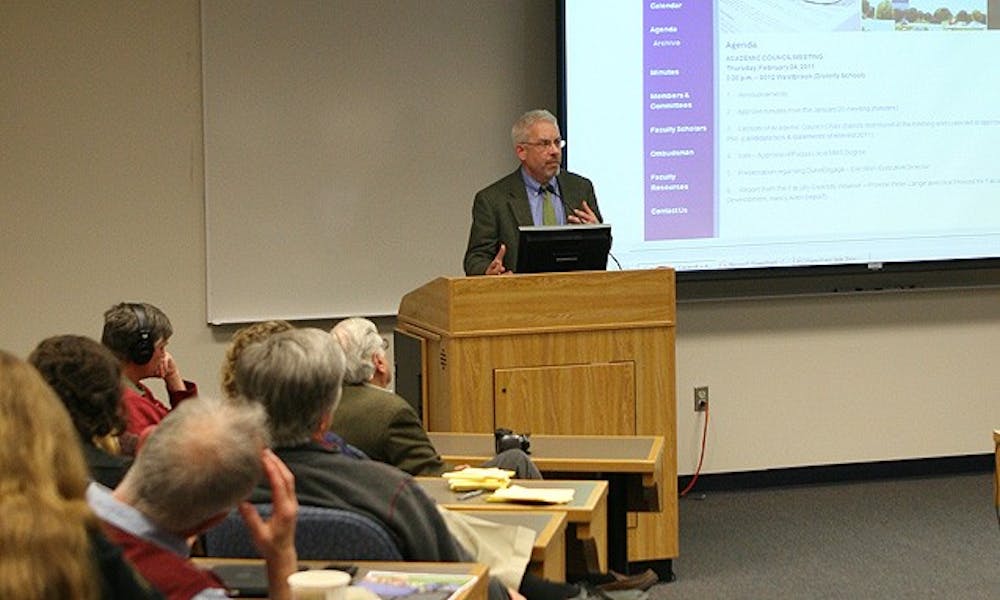The Academic Council received the biannual update of the University’s Faculty Diversity Initiative and elected a new chair at its meeting Thursday.
In his report to the council, Provost Peter Lange commended the progress made in faculty diversity but added that there is still significant work ahead, particularly in the natural sciences and engineering.
“These efforts will continue as long as we believe we may be missing good candidates from a lack of effort to recruit,” Lange said. “Our science department has not been as successful at hiring the people whom [the departments] extend offers to.”
The Faculty Diversity Initiative was established in 2003 after the completion of the Black Faculty Strategic Initiative. The present initiative seeks to increase recruitment and retention of underrepresented minority and female faculty members.
Although the University has increased the total number of tenured and tenure-track women faculty in the past ten years, women are still considerably underrepresented in several fields.
Since 2005, recruitment rates for female faculty in the Nicholas School of the Environment have increased by 11.6 percent. In the Pratt School of Engineering, however, the number of female professors has declined by roughly 4.1 percent in the past five years. Women have the highest representation in the Nursing School, School of Medicine and Arts and Sciences—as of 2010, women make up 85, 36 and 35 percent, respectively.
Lange said the overall recruitment rates for black teachers have remained steady in the past 17 years. Since 1993, the engineering department has consistently recruited between one and three black faculty members each year. But Arts and Sciences—the most diverse school—has annually recruited between 17 and 41 black professors.
The Faculty Diversity Standing Committee will continue to emphasize recruitment, particularly at the Divinity School, the School of Law and the Fuqua School of Business, Lange said.
Additionally, the council named Susan Lozier, professor of earth and ocean sciences at the Nicholas School, as its new chair. Lozier plans to address and maintain the faculty’s role in overseeing Duke’s international affairs, encouraging interdisciplinarity and shaping undergraduate campus culture, according to her statement of interest.
“I’m honored to be selected by my colleagues as the next chair of Academic Council and I look forward to addressing the challenges ahead,” said Lozier, who is the first council chair from the Nicholas School.
Lozier will begin sitting in on executive committee meetings immediately, but she will officially step into her two-year position July 1.
In other business:
The council unanimously voted to convert the Fuqua School of Business’ Master of Management Studies pilot program into a permanent degree. The MMS program, which was instituted Fall 2009, is targeted toward recent college graduates. It is designed to prepare students who have strong liberal arts backgrounds for entering the job market by providing them with essential business skills.
Before the vote, Fuqua Dean Blair Sheppard shared some of the program’s initial successes with the council.
“Applications doubled from the first year to the second year,” Sheppard said. “[MMS graduates’] job success last year was the same as the outgoing MBA.”
At the council’s Jan. 20 meeting, Sheppard also presented a template for a global version of the MMS program which would have a curriculum identical to the local one but would take place overseas in countries like China and India. Because the Global MMS degree still has many details to be finalized, Council Chair Craig Henriquez, professor of biomedical engineering, deferred approval of the program to a future meeting.
DukeEngage Director Eric Mlyn gave a presentation sharing the program’s successes and future goals with the council. Mlyn said he hopes to raise more financial resources, enhance the “DukeEngage experience” and further connect DukeEngage to students’ curriculums.
“We want to deepen the DukeEngage experience,” he said. “What can students do when they get back to campus?”
Get The Chronicle straight to your inbox
Signup for our weekly newsletter. Cancel at any time.

